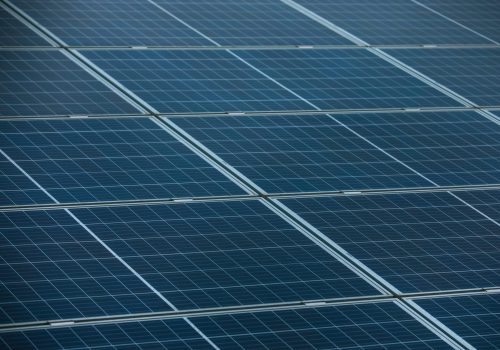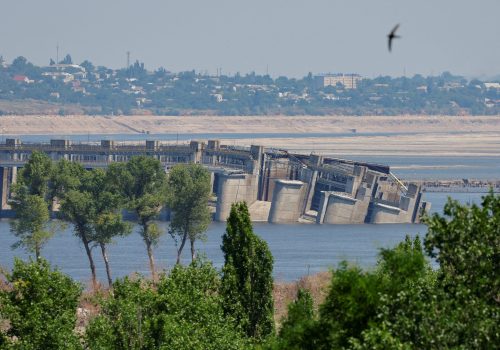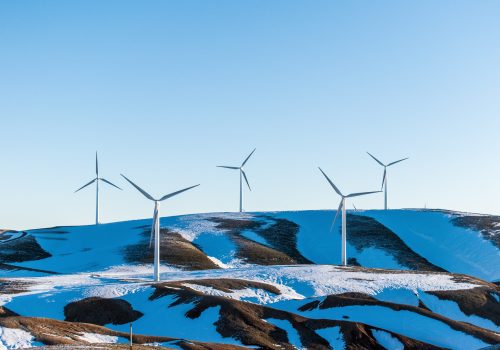The EU won the first round against Russia’s energy extortion. But can it keep up the fight?
The initial danger seemed Shakespearian. In the summer of 2022, the Economist fretted about Europe’s looming “winter of discontent” after Russia’s full-scale invasion of Ukraine upturned the continent’s energy system. The fear, echoed in other media, was that Russia would use Europe’s reliance on Russian hydrocarbons to weaken support for Ukraine in the European Union (EU). The threat of darkness, commentators argued, would chip away at EU resolve to aid Kyiv. A year later, this anticipated tragedy did not play out, and the EU has thus far resisted Russia’s energy extortion and maintained unity against the Kremlin’s invasion.
Such momentum may be difficult to maintain, however, and Europe’s decoupling from Russian hydrocarbons in the past year is just a prelude to the longer-term push that is needed to achieve decarbonization. Ramping up the energy transition in Europe is key to lasting energy independence from Russia, yet policies to advance this agenda are facing new headwinds. Meanwhile, the consequences of insufficient action on climate are increasing. Last year, Europe faced severe drought, floods, and forest fires. These climate change-related disasters had further far-reaching impacts across European society, from food production to power generation. More than 60,000 people died in heat waves across Europe last year. To demonstrate its sovereignty against Russian aggression and to reaffirm the continent’s role as a global climate leader, Europe must continue to reduce its reliance on Russian fuels while pursuing more ambitious renewable energy projects.
Europe’s energy triumph
Before its invasion of Ukraine, Russian exports covered 40 percent of the EU’s natural gas demand, 25 percent of crude oil demand, 40 percent of road diesel demand, and 30 percent of hard coal demand. Consequently, when Moscow cut natural gas supply to some member states in response to EU sanctions, gas prices quadrupled in the summer of 2022, topping 345 euros per MWh. Initially, many believed Russia’s energy extortion would force the EU into remaining passive in the face of the Kremlin’s invasion of Ukraine, particularly in the lead-up to the winter of 2022.
Despite such issues, Europe’s energy system has thus far avoided the worst-case scenarios. In fact, the continent has curtailed demand, pursued new international partnerships for supply, and increased gas grid resilience through new transmission infrastructure. Much of this was accomplished through the REPowerEU package, which launched in May 2022. Among other ambitious energy security goals, it called for dramatic decreases in EU imports of Russian hydrocarbons and for developing long-term renewable energy projects to cut carbon emissions. US solidarity has been crucial for Europe, as the United States has built out its export capacity and is now Europe’s top supplier of both natural gas and crude oil. Additionally, EU import bans on Russian coal, seaborne crude oil shipments, and refined oil products have gone into effect in August 2022, December 2022, and February 2023, respectively. (Czechia, Slovakia, Hungary, and Bulgaria successfully sought exemptions to certain oil product import bans. The exemptions are meant to be temporary, but could be extended.)
REPowerEU has also encouraged public and private investments into increasing the proportion of renewable power in Europe’s energy supply. As a result of this encouragement and EU member states’ individual drive for progress, solar installations increased by 47 percent, battery storage surged by 79 percent, heat pump adoption increased by nearly half, and overall investment in clean technologies jumped by nearly a third from 2021 to 2022.
A winter’s tale
Regardless of such successes, there is no guarantee that the EU will face similar circumstances in the coming winter. A handful of member states fell short of the EU-wide target to reduce gas consumption by 15 percent even though member states voted to extend the temporary reduction target through to March 2024. Meanwhile, production curtailments accounted for around half of the recent decline in industrial gas demand, and almost another third of the demand reduction was met by fuel-switching, primarily toward oil products. Oil, of course, is significantly more polluting than gas, and risks setting the EU back on its climate goals. In short, what appears to be an improvement—reduced industrial gas demand—may in fact carry big environmental costs and be unsustainable.
Additionally, Russia remains the second-largest source of Europe’s uranium and the largest foreign provider of nuclear utility services. According to Euratom, the EU as a bloc imported 20 percent of its natural uranium and 26 percent of its enrichment services from Russia in 2020. The EU’s share of Russian uranium imports decreased to approximately 17 percent in 2022, but its continued provision of uranium has drawn increasing concern from Ukrainian officials and transatlantic security experts.
Several EU members continue to rely on Russian nuclear energy services. French state-owned EDF, for example, maintains strong research and trade ties with the Russian state-owned nuclear energy company Rosatom. Since the 1970s, Rosatom has built reactors that are still operational in five EU countries (Bulgaria, Czechia, Finland, Hungary, and Slovakia), and it is currently constructing new reactors in Hungary. To their credit, EU members that have previously been more reliant on Rosatom have begun looking for uranium and nuclear energy partners elsewhere. Bulgaria, Czechia, and Slovakia have already secured alternative supply from US-based Westinghouse, and Slovakia may also halt construction of two Russian plants. It is imperative for EU countries to find alternative sources of uranium extraction, processing, and refining, and nuclear energy expertise, to ensure that they can greatly reduce their reliance on Russia for these resources to further strengthen their defenses against Russian aggression.
Europe needs an energy transition to break free of Russia
Even as the EU reduces its fuel-based reliance on Russia, the European Environment Agency recently estimated that weather- and climate-related extremes cost member states 560 billion euros from 1980 to 2021. Worse, 10 percent of the 560-billion-euro damage was felt in 2021 alone, and annual climate change-related costs will likely only rise—as demonstrated by disruptive drought and heat waves this summer. In total, the European Commission now estimates that 700 billion euros a year of investment is needed in addition to the 578 billion euros that has already been earmarked to transition the energy system. Achieving the profound changes required can establish lasting energy independence—but also, importantly, will ensure resilience to a rapidly changing global climate.
However, Europe’s energy transition has recently been plagued by delays in policymaking and implementation, such as protracted disputes over the role that combustion engine bans can play in decarbonizing the EU economy. Deliberation on the role of nuclear energy in the future energy mix has stalled progress on emissions reduction targets, standards for hydrogen production, funding guidelines for that production, and plans for electricity market reforms, among others. EU policymakers must not let internal disputes slow the momentum of the energy transition ignited by the 2022 energy crisis, particularly in the implementation of the Green Deal Industrial Plan, which is already facing significant funding issues even with its Strategic Technologies for Europe Platform, the European Commission’s resource to support domestic industries.
The picture that is emerging, therefore, is one of a Europe that remains at risk to Russian energy extortion as long as its energy transition remains incomplete. Instead, the European Union should redouble its efforts. Although Russia’s invasion of Ukraine commenced eighteen months ago, Europe must remain committed to its campaign to reduce its reliance on Russian energy resources and address the threat of climate change.
Jonah Allen is a nonresident fellow with the Atlantic Council’s Europe Center and a research fellow at the Jain Family Institute.
Francis Shin is a research assistant at the Atlantic Council’s Europe Center
Further reading
Wed, Sep 6, 2023
Policy memo: A NATO-style spending target could fund long-term decarbonization
In-Depth Research & Reports By Ben Judah, Francis Shin, Rachel Rizzo, Théophile Pouget-Abadie
EU member states and like-minded allies should set national-level spending targets, each based on a percentage of their respective annual GDPs, for decarbonization-related purposes. This would provide the basis of an international coalition that would ramp up global climate spending and set a useful benchmark to anchor high-level diplomatic discussions on the subject.
Wed, Aug 2, 2023
Transforming Ukraine into a European energy hub
Issue Brief By Richard L. Morningstar, András Simonyi, Olga Khakova, Paddy Ryan
In this issue brief, Global Energy Center experts explore the potential for Ukraine’s energy sector to strengthen European energy security and decarbonization objectives. The brief explores how Ukraine can reform its energy sector to attract investment and create new revenue streams, and how transatlantic partners in government and the private sector can support Ukraine’s clean energy transformation.
Thu, Apr 6, 2023
Accelerating the energy transition to strengthen European energy security: Key barriers to overcome
Issue Brief By Richard L. Morningstar, András Simonyi, Olga Khakova, Paddy Ryan
The role of decarbonization in European energy security, the obstacles impeding clean energy development, and the opportunities for transatlantic collaboration towards low-carbon energy security.
Image: Electric power transmission miniatures are seen in front of displayed EU and Russian flags in this illustration taken, December 5, 2022. REUTERS/Dado Ruvic/Illustration


